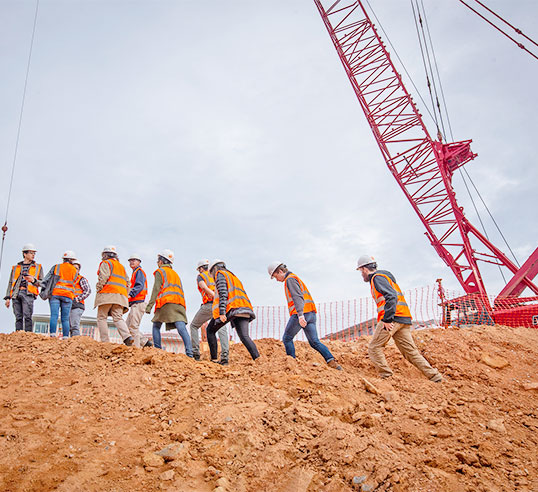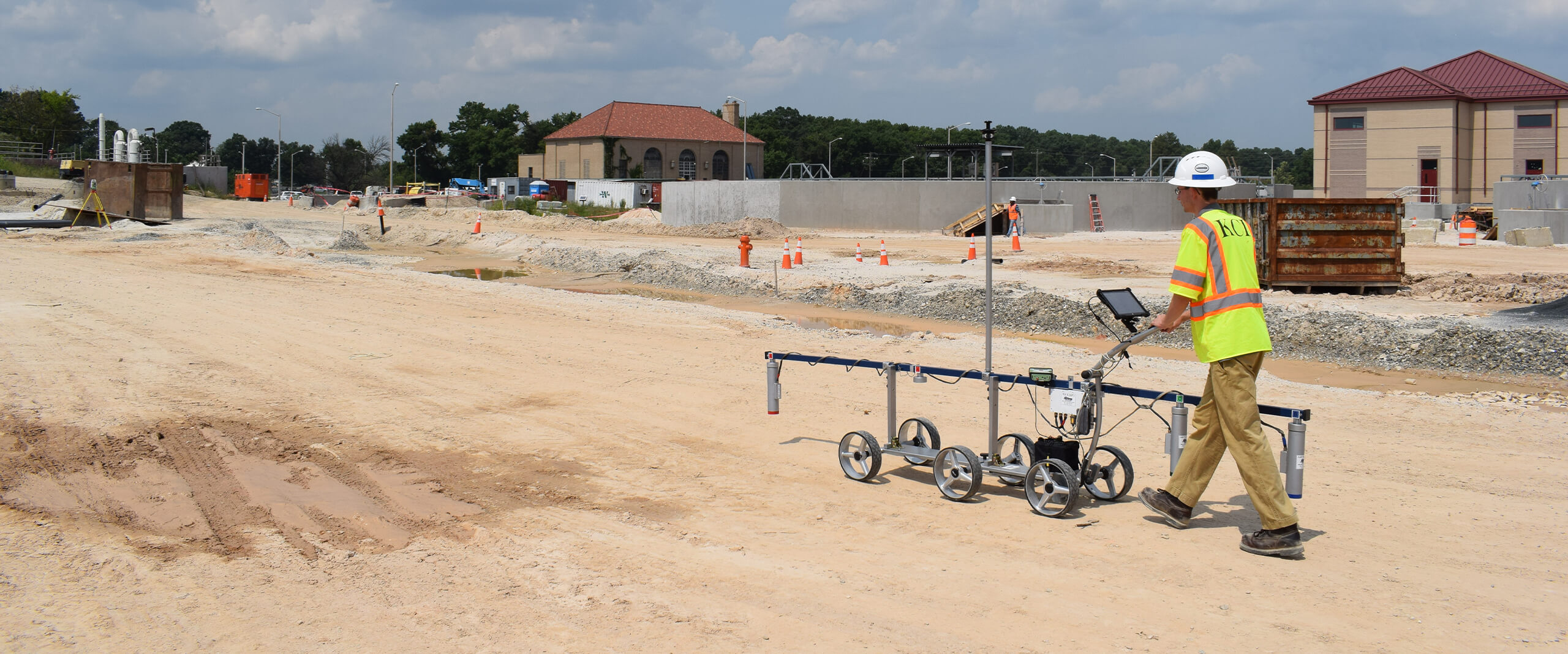Essential Abilities for Prospering in the Geotechnical Industry Today
Essential Abilities for Prospering in the Geotechnical Industry Today
Blog Article
Recognizing the Comprehensive Role of Geotechnical Engineers in Ground Investigation and Soil Analysis for Construction Projects
Geotechnical engineers are indispensable to the success of building tasks, offering crucial insights through thorough ground investigations and dirt analysis. Their competence in examining soil habits and using sophisticated testing methods educates crucial choices that support architectural stability and safety and security.
Duty of Geotechnical Engineers
The crucial duty of geotechnical engineers in building and construction projects can not be overstated, as they give vital insights into dirt behavior and site problems. These experts are tasked with examining the viability of the ground for various kinds of frameworks, making sure security and security throughout the construction process. Their competence incorporates a vast range of activities, consisting of website characterization, soil sampling, and lab screening, which are critical for identifying the mechanical and physical residential properties of the dirt.
Geotechnical designers use their searchings for to create fundamental layouts that accommodate load-bearing requirements and mitigate risks associated with dirt liquefaction, negotiation, and slope stability. They play an essential role in determining prospective risks, such as groundwater variations and contamination, which can significantly affect project stability. They team up with architects, civil designers, and contractors to make sure that geotechnical considerations are incorporated into the total design and construction stages.
Ground Investigation Strategies
Ground investigation techniques create the backbone of geotechnical design, allowing engineers to acquire a comprehensive understanding of subsurface problems. These methods are vital for examining soil buildings, figuring out groundwater levels, and recognizing possible geological threats.
Typical methods consist of borehole drilling, which allows for the extraction of soil examples at various depths, supplying essential information for analysis. Furthermore, sitting testing methods, such as Conventional Infiltration Tests (SPT) and Cone Penetration Examinations (CPT), are employed to review dirt strength and thickness directly in the ground.
Geophysical techniques additionally play a substantial function in ground examinations. Strategies such as seismic surveys and electric resistivity tomography aid examine subsurface attributes without substantial excavation. geotechnical eng. These non-invasive techniques are particularly advantageous in big or sensitive areas where disruption must be reduced
Furthermore, exploratory trenches can be excavated to visually evaluate dirt layers and recognize any kind of abnormalities. Each of these strategies contributes distinct insights, permitting geotechnical designers to establish exact website evaluations and inform design decisions. In recap, a mix of these ground examination methods is essential for effective building and construction jobs, guaranteeing safety and structural honesty.
Soil Analysis Approaches
Soil analysis techniques are crucial for understanding the chemical and physical residential or commercial properties of dirt, which directly influence the design and construction of structures and various other structures. Numerous techniques are utilized to examine dirt qualities, making sure that geotechnical designers get accurate data for informed decision-making.
One frequently made use of approach is grain size analysis, which identifies the circulation of particle sizes within a soil example. This is essential for classifying soil types and forecasting their actions under load. An additional necessary method is Atterberg limitations testing, which examines the plasticity and wetness content of fine-grained soils, providing insights into their design homes.

Field tests, such as Common Penetration Examinations (SPT) and Cone Penetration Examinations (CPT), offer beneficial in-situ data pertaining to soil toughness and stratification. Jointly, these soil analysis approaches develop the foundation of geotechnical examination, allowing designers to develop safe and reliable frameworks customized to the particular problems of the site.
Danger Reduction Methods
Implementing efficient risk reduction techniques is essential for geotechnical designers to address potential difficulties in construction projects. These strategies are crucial in determining, assessing, and handling dangers connected with soil conditions, site security, and groundwater variations, which can adversely impact job end results.
One primary technique entails carrying out thorough site investigations that make use of advanced geophysical techniques and detailed dirt sampling. By obtaining exact information on subsurface problems, designers can make enlightened choices on layout and construction methods. Additionally, utilizing anticipating modeling devices permits for the simulation of numerous circumstances, making it possible for designers to predict possible troubles and apply safety nets.
Moreover, developing clear interaction networks amongst task stakeholders cultivates a collaborative method to run the risk of monitoring. Normal updates and consultations guarantee that all celebrations are conscious of the progressing site problems and can adapt their methods accordingly.

Influence on Construction Jobs
The performance of risk reduction approaches directly influences the general success of construction projects. Geotechnical engineers play an essential duty in this domain, as their proficiency in ground examination and soil evaluation educates crucial choices throughout the building and construction procedure. By properly analyzing dirt problems and determining prospective risks, these professionals enable project groups to design reliable options that minimize dangers connected with ground instability, water infiltration, and other geotechnical challenges.
The impact of comprehensive geotechnical analysis appears in numerous aspects of construction projects, including price administration, job timelines, and architectural stability. Early identification of concerns permits timely interventions, reducing costly hold-ups and spending plan overruns. In addition, a comprehensive understanding of website problems boosts the style and engineering procedure, making sure discover this that frameworks are built to hold up against ecological pressures and possible all-natural catastrophes.
Inevitably, the contributions of geotechnical engineers are integral to the successful implementation of building and construction projects. Their job not just fosters safety and security and conformity with guidelines but additionally enhances the long-lasting sustainability of structures, making sure that they do effectively throughout their desired life expectancy. The collaboration in between other stakeholders and geotechnical teams is essential for achieving optimal results in construction endeavors.
Verdict
To conclude, geotechnical engineers do a critical function in building and construction jobs through extensive ground investigations and soil analyses. Their knowledge in assessing dirt behavior, utilizing numerous examination methods, and implementing risk reduction techniques considerably contributes to the structural honesty and security of constructed settings. By working together with multidisciplinary groups, these professionals boost project efficiency and guarantee conformity with safety and security standards, eventually causing successful building end results and reduced potential dangers.
Geotechnical designers are integral to the success of construction tasks, supplying necessary insights via comprehensive ground examinations and dirt evaluation.The pivotal function of geotechnical designers in construction jobs can not be overemphasized, as they supply essential insights right into soil actions and site problems. Their knowledge includes a large array of activities, including website characterization, dirt sampling, and research laboratory screening, which are essential for identifying the physical and check here mechanical residential or commercial properties of the soil.
By properly evaluating dirt conditions and recognizing possible risks, these specialists make it possible for project groups to create effective remedies that reduce dangers associated with ground instability, water infiltration, and other geotechnical obstacles.
In final thought, geotechnical engineers do an important feature in construction tasks through detailed ground examinations and soil evaluations.
Report this page